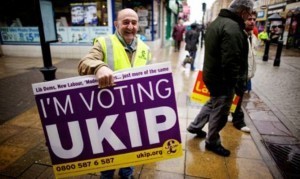UKIP could save Britain – but first it needs a coherent economic policy

Why does the monumentally tedious soap-dodging pseud Russell Brand still sell so many books?
Why is Ed Miliband, a man with the charisma of used dental floss and the intellectual nuance of Hugo Chavez, still seriously in the running to become Britain’s next Prime Minister?
And why is Patrick O’Flynn, the economics spokesman for Britain’s most libertarian mainstream party UKIP, flirting with the kind of wealth taxes and turnover taxes you’d more usually associate with the Greens or the Socialist Workers’ Party?
The basic answer to these questions is one and the same: because there are many, many voters out there who sense there’s something not quite right about this “recovery” we’re experiencing; that while the rich seem to be getting richer and richer, the rest of us are finding it harder to make ends meet than ever we can remember.
So when Brand, Miliband and Patrick O’Flynn publicly advocate greater government intervention to make things fairer they are pushing at an open door. What half way decent person wouldn’t want everyone to be paid a “living wage”, or for Google to pay its fair share of taxes or for the superrich to have to pay a bit more of the money (which they can well afford) for their diamond-and-foie-gras encrusted Manolo Blahniks and their pashmina-trimmed Murcielagos?
Well I wouldn’t, for one, and it’s not because I don’t care and it’s not because I don’t think there’s something seriously wrong with the state of Britain’s economy. It’s simply because I recognise that the statist measures which Brand, Miliband and O’Flynn are advocating are a major part of the problem they are presuming to resolve.
Put very simply, the crisis all the world’s Western economies are facing right now is a reflection of the relentless expansion of government. Free market capitalism (insofar as it ever existed) has been replaced by crony capitalism in which an unholy alliance of financiers, lawyers, corporatists, politicians, left-leaning charities and bureaucrats have been allowed to bleed the dwindling sector of the economy that still produces real, useful stuff almost dry.
This crisis has been accelerated since the 2008 crash by the policy of government money printing – aka quantitative easing (QE) – which has artificially inflated the price of assets (such as houses) putting them further and further out of reach of struggling wage earners.
To put it into perspective, here’s a paragraph from Dominic Frisby’s excellent book Bitcoin – The Future Of Money (Unbound).
In the US wages have gone from around $6,000 per annum in 1971 to $44,000 today. So while the money supply in the US has increased by 2,000 per cent, wages have increased by 750 per cent. The inequality in the UK is greater. Money supply has increased by 6,700 per cent, wages by just 1,250 per cent. Wages, in short, have failed to keep up with inflation.
So all those people out there who think Russell Brand has put his finger on something, that Ed Miliband has a point, and that Patrick O’Flynn is talking sense when he says the corporations are getting away with murder are absolutely correct in their instincts. Where they couldn’t be more wrong, though, is in imagining that the solution lies in giving more power to the alliance of statist forces which created the problem in the first place.
Read the rest at Breitbart London
James Delingpole's Blog
- James Delingpole's profile
- 35 followers



